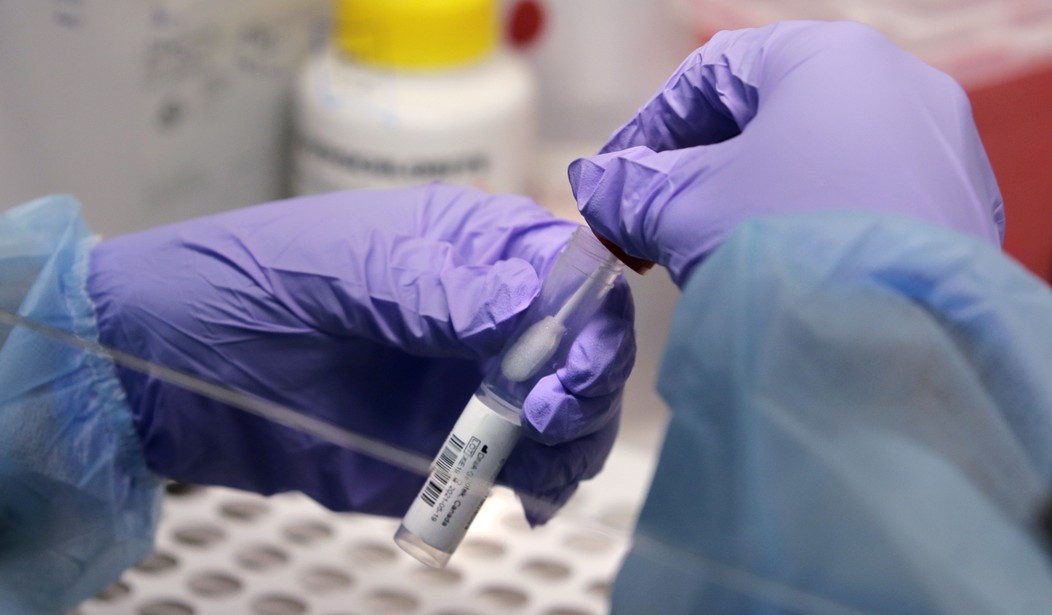"We do not believe that any type of laboratory-based scenario is plausible." That's the key sentence in an article published in Nature Medicine on March 17, 2020, titled "The Proximal Origin of SARS-CoV-2."
It's also a prime example of eminently credentialed and government-subsidized scientists saying the exact opposite of what they believed in an attempt -- successful at the time, but now, three years later, exposed -- to deceive the public.
The article appeared, as the date indicates, just as the spread of COVID was becoming apparent. It also appeared after Sen. Tom Cotton (R-Ark.) said in January 2020 that the virus could have leaked from "China's only biosafety level-four super laboratory that works with the world's most deadly pathogens" in Wuhan.
Cotton was careful to say that a lab leak was not proven and that the virus could also have been transmitted through an animal, and he dismissed the possibility of an intentional leak.
The Washington Post quickly dismissed A lab leak origin as a "fringe theory" and a "conspiracy theory" by The New York Times. Those characterizations were attributed to government and government-financed scientists -- the same bunch who would shortly produce the "Proximal Origin" paper.
The pushback against the lab leak theory has now been revealed as a fraud, thanks to the work of journalist Matt Taibbi, academic Roger Pielke Jr., and the House Select Subcommittee on the Coronavirus Pandemic.
The real conspiracy had roots in a February 2020 conference call led by Dr. Anthony Fauci, head of the National Institute of Allergy and Infectious Diseases at the time, and Dr. Francis Collins, his boss as head of the National Institutes of Health, and including the four scientists who would co-author the "Proximal Origin" paper.
Recommended
In February, as the House subcommittee documents reveal, all four were expressing thoughts directly contrary to what they put their names to in March.
-- "I really can't think of a plausible natural scenario," wrote Dr. Robert Garry. "In the lab it would be easy."
-- "The only thing here that strikes me as unusual," wrote Dr. Andrew Rambaut, "is the furin cleavage site," something much more likely to be produced by a lab than by natural transmission.
-- Dr. Edward Holmes wrote he was "60-40 lab."
-- The main work over the last couple of weeks wrote Dr. Kristian Andersen, "has been focused on t(r)ying to disprove any type of lab theory, but we are at a crossroads where the scientific evidence isn't conclusive enough to say we have high confidence in any of the three main theories."
Not exactly "We do not believe that any type of laboratory-based scenario is plausible," eh?
Why the change? As one conference call participant put it, "further debate about" a lab leak would "do unnecessary harm to science in general and science in China in particular."
Unstated but known to every one of the scientists was that Collins and Fauci had approved cooperation with the Wuhan lab and controlled millions in research dollars coveted by every scientist.
Their intentions were not in doubt. On April 16, Collins told Fauci he hoped "Proximal Origin" would put down "the very destructive conspiracy" of the lab leak theory and on April 17, Fauci recommended it to reporters as the product of a "group of highly qualified evolutionary virologists," without mentioning his own role.
That same month, Andersen, in emails, admitted that a lab leak was possible and bragged about misleading New York Times reporter Donald G. McNeil Jr.
I found the cynicism revealed in these emails shocking, even though I have written critically, in July 2021 and March 2023, about government scientists' attempts to discredit the lab leak theory. I note that statistics guru Nate Silver, not a member of any right-wing conspiracy, is now similarly appalled.
"I'm deeply disappointed by the scientists' conduct here and how unmoored they were from any attempt at truth-seeking," he wrote last week. "The COVID origins story has also been a journalistic fiasco," he added, opining that "journalists are more prone toward being manipulated by bad apples in academia and science than they were ten or twenty years ago."
Evidence for that predilection comes from New York Times reporter Sheryl Gay Stolberg, who last week tweeted that a House Republican hearing "raised thorny questions about free speech in a democratic society: Is misinformation protected by the First Amendment? When is it appropriate for the federal government to seek to tamp down the spread of falsehoods?"
Leave aside the deliciously Orwellian flavor of her verb "tamp down" and her astonishing ignorance of First Amendment law and reflect on how "Proximal Origin" suggests that the government and government-financed credentialed experts are often better at generating misinformation and falsehoods than at detecting them.
Michael Barone is a senior political analyst for the Washington Examiner, resident fellow at the American Enterprise Institute, and longtime co-author of The Almanac of American Politics.

























Join the conversation as a VIP Member